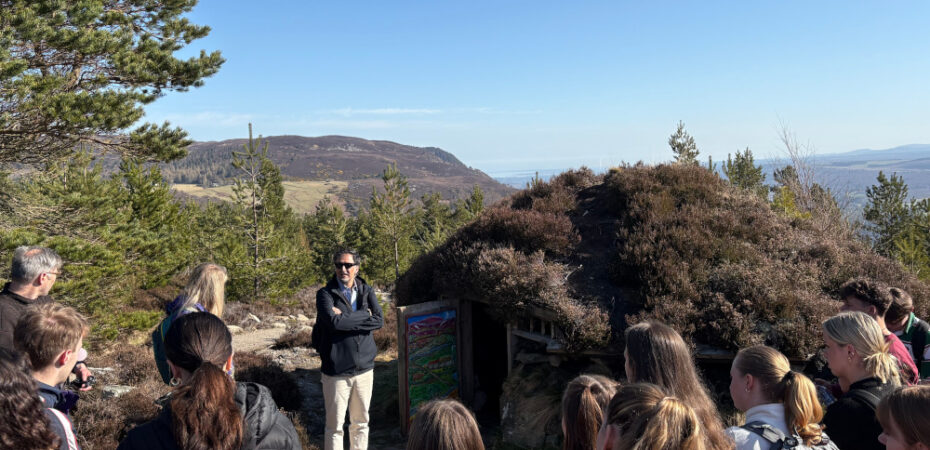
In this extra post, Sarah Kline and Felix Clarke, explore the concept of repetitive pedagogy as a teaching method, and show how poster-making can be used as a creative form of assessment using repetition. This method was developed in a new field course, Scotland Futures, within the School of GeoSciences Geography MA degree programme, called Scotland’s Futures. Sarah and Felix are tutors on the course as well as PhD students.
As tutors on a new field course called Scotland’s Futures, which sits within the School of GeoSciences Geography MA Degree Programme, we were in a unique position to observe the various pedagogical elements of this course. Reflecting on students’ feedback and our own experiences of tutoring, repetition emerged as an overarching theme – both regarding how students were prepared for a novel assessment as well as their feedback on the design and delivery of Scotland’s Futures. This blog post reflects on our experience of teaching, assessing and working through the feedback for this course, as well as an exploration of repetition as a teaching method.
What is ‘repetitive pedagogy’?
For the purposes of this reflection, we understand ‘repetitive pedagogy’ as the iterative use of teaching practices and techniques to achieve particular learning outcomes. Repetition, in this case, does not mean simply doing the same thing over and over again; rather, it implies a distinctly additive function, wherein the recursive use of teaching methods and procedures compounds student learning. Repetition in pedagogical settings isn’t always good. Consider, for instance, the repetition of negative discussive associations within pedagogical settings leading to teaching spaces upholding conjugated oppressions (Kumashiro, 2002). Or the repetition of conflict patterns from outside the classroom being brought within it (Newbery, 2009). Yet the merit of repetitive practice has also been explored, particularly in STEM subjects, where it can allow for greater student-led learning (e.g., Trninic, 2018). We suggest that this approach has an analogous application in the social sciences, including human geography, especially when using creative (and unfamiliar) forms of assessment.
The course: ‘Scotland’s Futures’
In 2025, the field course ‘Scotland’s Futures’ ran for the first time within the Geography MA degree programme. The course consisted of a five-day field trip to Inverness preceded by five lectures and four tutorials. The field trip itself consisted of three themed activity days (on community land ownership, rewilding, and cold-water swimming) which were run concurrently across three different sites. These were overseen by the same members of academic staff each day, but the student groups and associated postgraduate tutors rotated between each of them. As this was a pre-honours course, students had limited experience of field work at this point in their degree. The students were assigned to small project groups in which they worked from the first tutorial to the end of the field trip, which culminated with a poster presentation session as part of their assessment. As tutors on the course, we facilitated the tutorials, attended each of the three different activity days, and were involved in assessment.
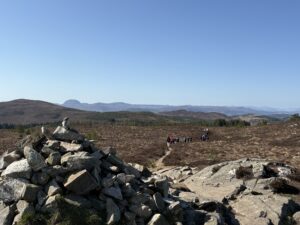
Poster-making as a creative, repetitive teaching method
Scotland’s Futures required the students to create posters in three of their four preparatory tutorials, as well as one reflecting on their experiences for each of the field days. These six posters served as successive attempts to perfect the poster form in which a topic or theme could be both empirically and conceptually represented in an accessibly graphical format. The repetitive use of poster-making severed to familiarise students with the method and how they could apply it to the material they learned during Scotland’s Futures.
The use of posters as a teaching method was developed throughout the duration of the course to reflect a more thematic and interpretative approach to presenting field data. This deviates from more traditional uses of posters within academic spaces, prompting some uncertainty from staff regarding how a poster should be made and assessed. The staff on this course were also learning alongside the students, constantly reflecting on – and at times revising – the best way to deploy poster-making as a method of learning and assessment. For instance, after witnessing the students struggle with finding a cohesive argument for their poster, staff began encouraging students to collate their ideas from each day on a preliminary poster before making a more curated, finalised version. The chance to refine the pedagogy of poster-making in situ was only possible due to staff witnessing repeated attempts by students to create posters.
The poster session which served as one part of the students’ final assessment involved students presenting a collaboratively created poster on one of the activity days to staff. The students were assessed on the visual coherence of the poster and the presentation of their argument.
Following this assessment, we collected some initial feedback on the course, also in the form of a poster. Student feedback was generally positive, with some suggestions for future improvement especially around the guidance on assessment.
Students’ experiences of creative assessment
Students don’t always warm to a novel assessment. Their lack of experience with the form (in this case presenting a poster) can generate its own anxieties. Creative learning can be stimulating but it doesn’t necessarily assuage student concerns about academic expectations. They still worry about producing ‘good’ or ‘correct’ work which can provoke a sense of uncertainty. This speaks to broader pedagogical expectations around student learning within higher education spaces, specifically field courses (see: Swanton, 2022).
Poster-making also highlighted irregularities which emerge from differing guidance and approaches to student learning across a large teaching team. Across three activity days, and three rotating student groups, inconsistencies are inevitable (especially on a new course) – but they are not necessarily negative. They can broaden student learning and encourage diverse perspectives and points of engagement. For instance, the weather played a significant role in the cold-water swimming day, as it mediated different student experiences of being on the beach. Students critically reflected on these differences in their posters. However, inconsistencies do prove challenging when it comes to assessment.
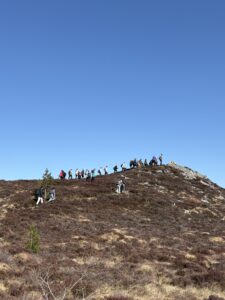
Using assessment rubrics to address consistent guidance
The feedback itself was repetitive, with 80% of the student groups noting a lack of set marking criteria and consistent guidance around the expectations of the poster. While repetition enabled a practical understanding of the mechanics of poster-making, it didn’t allay student concerns around representing the conceptual and theoretical course materials. The use of assessment rubrics has been incorporated into next year’s course to attend to this issue. As Scotland’s Futures was in its first year, there were many uncertainties and areas for flexibility and improvisation in the field, which translated to student uncertainty around the assessment. We feel that there is value in repetition as long as the repetition is not just a process of recursive learning, but also employs an additive function for student capacity to analyse, translate, and operationalise their own learning.
Read our follow-up post on Developing cohesion through repetitive pedagogies in a field course.
References
Kumashiro, K. (2002). Against repetition: Addressing resistance to anti-oppressive change in the practices of learning, teaching, supervising, and researching, Harvard Educational Review 72: 68
Newbery, L. (2009). It’s about time! Repetition, fantasy, and the contours of learning from feminist pedagogy classroom breakdown. Gender and education, 21(3), pp.247-257.
Swanton, D. (2022). From field experiences to experiential learning: The importance of reflection. Teaching Matters. Retrieved from https://blogs.ed.ac.uk/teaching-matters/from-field-experiences-to-experiential-learning-the-importance-of-reflection/
Trninic, D. (2018). Instruction, repetition, discovery: Restoring the historical educational role of practice. Instructional Science, 46(1), 133-153.
Acknowledgements
We would like to express our gratitude for all of the students who participated in the inaugural voyage of Scotland’s Futures, and for the feedback they generously provided. We’d also like to thank the Course Organiser for Scotland’s Futures, Fraser MacDonald, for encouraging us to write these blogs and for providing feedback on early drafts. We would also like to extend our thanks to the other staff and convenors of the course, not only for their efforts in the design and implementation of the course but for their feedback and support in the creation of this blog. Finally, we would like to thank Prof. Dan Swanton for encouraging us to write and submit this blog to Teaching Matters.
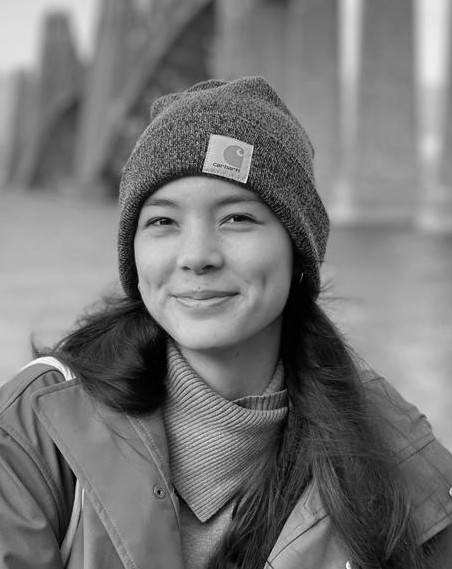 Sarah Kline
Sarah Kline
Sarah Kline (she/her) is a PhD student in human geography and an Advance HE Associate Fellow. Her research explores youth geographies and intersections with climate change and cultural heritage.
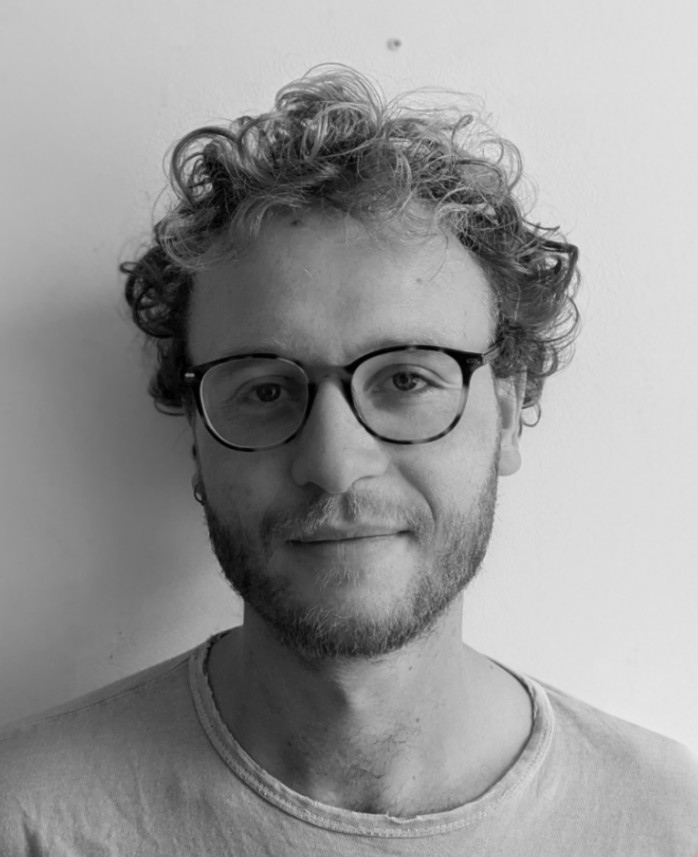 Felix Clarke
Felix Clarke
Felix Clarke (he/him) is a PhD student in human geography, and an Advance HE Associate Fellow. He is co-coordinator of the School of Geoscience’s internal ‘Talking about teaching’ events series on ‘student autonomy’ for the academic year 2025-26. His research is on environmental politics and the relationships between humans and non-human animals.

